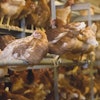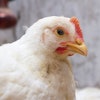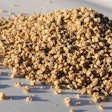Current turkey production systems rely on antibiotics as clostridial infection remains difficult to avoid without their use. However, the market is increasingly receptive to alternatives to pharmaceutical products and, while antibiotics may be available on prescription for treatment use, alternatives are an increasingly fruitful area of research and development.
Pre- and probiotics seem logical alternatives to antibiotics and growth promoters, and the key to their use is very early dosing. This makes sense, particularly as the main function of these products is regulation of the gut bacteria.
It is well established that gut microflora strongly influences the host's health and intestinal responses in various ways, including immunologically and nutritionally. However, little is known about the microflora of the turkey gut, and current knowledge has primarily been extrapolated from chicken research.
We know that, although the gut of the newly hatched poult is sterile, organisms rapidly grow and colonise it, and that those bacteria found in the litter are the first bacteria that will colonise the poult gut. It is also known that a typical microflora in the small intestine is established within two weeks, but that the adult caecal flora takes more than 30 days to develop and establish. This fact is more important in turkeys than in chickens due to the longer fattening period, affording greater possibilities for modulation before gut health dysbiosis appears.
Extrapolation to turkeys?
The caecal microflora of chickens has been extensively investigated by the use of culture-based methodologies and, more recently, molecular approaches have been employed to investigate the bacterial ecology of the chicken intestine. It has been found that the majority of bacteria in the caecum of the chicken are proteobacterium (which include some potential pathogenic enterobacteria), flavobacterium, lactobacillus, clostridium and bacteroides. However, little is known about the role of these bacteria in the turkey gut, although it can be assumed that the main bacterial groups are similar. Additionally, we know from other monogastric animals, that the ratio lactobacilli:enterobacteria can be used as an index of gut health. Can this be extrapolated to turkeys?
Despite this lack of knowledge, bioregulatory products are now used in turkey feed to maintain the balance of gut microbial flora by stimulating the lactic bacteria and decreasing enterobacteria.
Some recent studies have been attempted to more closely monitor the metabolic activity of some probiotics based on indigenous intestinal bacteria in turkey poults by using rRNA targeted probes. The results indicate that the pro-biotic E. faecium strain enhanced metabolic activity of lactobacilli and increas-ed lactate concentration, although variations in colony counts of lactic acid bacteria were only apparent on the 28th day of life.
Trial at Universitat Autonoma de Barcelona
A trial at Universitat Autonoma de Barcelona facilities was run to measure the growth and gut health effect of a commercial probiotic based on a sporulated non-commensal bacteria (B. toyoi, Toyocerin) on female turkeys. The birds were divided into a control group and an experimental group that received 1,000 ppm of the probiotic per tonne of feed. The birds were started at hatch and finished at 72 days old.
Lactic acid bacteria and enterobacteria were checked in the duodenum and caecum by traditional methods. We found that the birds fed with B. toyoi showed a higher concentration of lactic acid bacteria in the duodenum and caecum when compared to control animals at days 28 and 72, although statistical significance was only reached in duodenum counts at day 72.
As a result, birds fed with the probiotic showed a higher ratio lactobacilli:enterobacteria which, in turn, was reflected in a higher body weight, in particular. If separated into two categories, the difference was most pronounced in those with a lighter body weight, particularly during the first four weeks of life, as mean body weight gain was higher due to better feed conversion ratio for the poults fed with the probiotic.
It can be concluded that the use of B. toyoi results in better performance and that the bioregulatory effect is similar to that demonstrated in other species. In poultry, and particularly turkeys, an increase in lactic acid bacteria may help in the most common gut health problems that emerge during fattening.
Potential problems with diet, pathogens
Currently, problems are mainly associated with changes in birds' allocation and diet protein and energy concentration. Consequently, potential pathogens can overgrow, resulting in slow growth, higher mortality, higher medication costs and, therefore, losses in economic gain per fattening. In particular, the use of probiotics that increase lactic acid bacteria should be taken into account to reduce pathogenic problems related to the increase of clostridium and related bacteria. It is also known that lactic acid bacteria have the ability to produce specific bacteriocins that can kill clostridia.
Inclusion of B. toyoi in chicken diets also leads to improved immune response, which can help in regulating gut health dysbiosis associated with the stress of poult fattening.
Despite incomplete knowledge of the turkey microbiota, studies suggest that probiotic bacteria increase lactic acid bacteria, limiting overgrowth of potential pathogens. With B. toyoi there is an increase in lactic acid bacteria, and an improvement in feed conversion ratio of over 10 percent.






